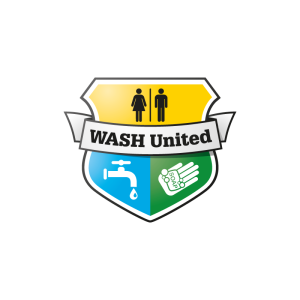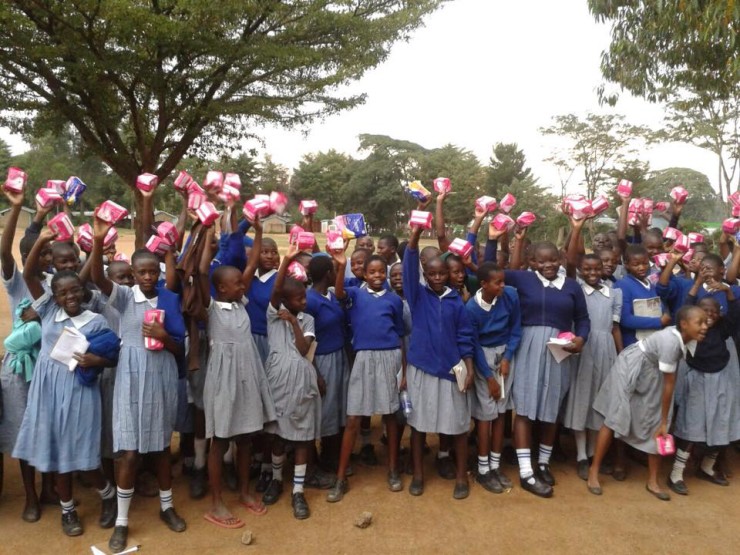Guest Post by Danielle Keiser, WASH United
 WASH United, initiator of Menstrual Hygiene Day, has been working closely with the Kenyan government and local NGOs to establish a national policy around Menstrual Hygiene Management (MHM).
WASH United, initiator of Menstrual Hygiene Day, has been working closely with the Kenyan government and local NGOs to establish a national policy around Menstrual Hygiene Management (MHM).
Today we sat down with the team at WASH United Africa in Nairobi, Kenya–Beverly Mademba, WASH in Schools Programs Manager, Alfred Muli, Program & Research Associate, and Winnie Nyabenge, Program Associate–who have been coordinating the national effort, to learn about how policy change in the menstrual hygiene management (MHM) sector can be achieved. Here’s what they told us.
It seems like menstruation is a really hot issue in Kenya right now. Why do you suppose the issue is now gaining more attention than ever before?
Yes, you’re right! Menstruation is actually red hot in Kenya for a number of reasons.
First, the interest and demand for the issue is enormous! With more and more data finally surfacing detailing the wide-ranging negative impacts of poor MHM, many people are responding with interventions and solutions in Kenya–and beyond. At the beginning, the majority of the NGOs working in MHM came from the water, sanitation and hygiene (WASH) sector. Now, people and organizations interested in advancing education, health, human rights, child protection and other sectors are getting involved. Even private social businesses want to help tackle the issue by bringing innovative MHM products to the market! It’s actually quite noticeable just how much MHM has grown in the last years, both in terms of work and media attention on the issue. Instead of just WASH, MHM is now being tackled from many different perspectives by many different organisations.
Secondly, the increased campaigning and advocacy surrounding Menstrual Hygiene Day has really had a huge impact on drawing attention to the issue. Two contributing factors include the fact that we at WASH United are the initiators and drivers of Menstrual Hygiene Day and have our African office (and our great team!) in Kenya.
Lastly and most importantly, the Kenyan Ministry of Health has taken an impressive leadership role in driving the issue and has done an excellent job of coordinating stakeholders, particularly in the WASH sector.
What are the key priorities of the proposed MHM policy in Kenya (education, product access, environmental issues, health, etc.?) and how will the policy be implemented?
Seeing as how MHM is an issue that cuts across different sectors, it is absolutely vital that the concerns of all the key stakeholders are considered. This means not only ensuring adequate sanitation and hygiene infrastructure and the affordability and accessibility of menstrual materials, but also providing education, information and addressing cultural barriers to improving MHM, such as myths and taboos. It also means taking into account the importance of behavior change around hygiene and disposal. The obvious target for the MHM policy are schools, but we are also trying to push the policy agenda to institutions (i.e., prisons, hospitals, etc.) as well to help ensure that it benefits as many women and girls in Kenya as possible.
Therefore the key priorities of the MHM policy are as follows:
- Defining safety and quality standards for reusable products
- Provision for management of MHM waste
- Defining minimum standards for MHM programming (for both infrastructure and behavior change interventions)
- Ensuring relevant reproductive health education
- Mainstreaming MHM into monitoring and evaluation
- Engaging the corporate sector to address the safety of their menstrual hygiene products; encouraging them to market their products responsibly and with “period positivity”
After the policy is finalized on a national level, the critical part is the contextualizing and institutionalizing of the policy in the 47 counties within Kenya to ensure real impact on the ground. This means conducting in-depth situational analyses to truly understand the specific issues in each county, as well addressing the needs and capacity requirements of the local governments.
How have you built relationships with others to advance the initiative? Who have been the most valuable partners?
We’ve built relationships in two ways: 1.) Through national thematic technical working groups (TWGs), such as the hygiene promotion TWG, the school WASH TWG and the policy and research TWG just to name a few. 2). Menstrual Hygiene Day has allowed us to collaborate with new partners both inside and outside the WASH sector giving us the opportunity to form strong coalitions that continue to garner media attention and influence local and national governments.
Besides this, we’ve been in constant dialogue with interest groups including academia, manufacturers, corporate entities and relevant government agencies.
All partners are equally valuable, representing their different interests. Key players at least working on the policy have been WASH United, Kenya Water for Health Organization (KWAHO), WASH Alliance Kenya (WAK), PATH, UNICEF, Transformation Textiles, ZANA Africa, I-CARE, Saidia Dada and networks such as KEWASNET. However, we must really commend the Ministry of Health for the amazing work they have done in coordinating us all.
If menstrual education is a component, what are the barriers to establishing a nation-wide educational initiative of this sort? Have there been any particular surprises or unanticipated blocks?
Great question. Currently the curriculum teaches about anatomy and the biological processes that occur during puberty. It does not, however, dive into hygienic management of the period, sanitary disposal of used products, and the facts vs. myths that surround menstruation.
One problem that we’ve run into with trying to establish a nation-wide menstrual health education curriculum is that stakeholders (including donors) feel like they need to ‘have their names on it’. To us, this breeds unnecessary competition. If we are all invested in the same goal – improving how girls manage and understand their periods so that they can flourish – it’s not important who developed what educational component. It’s about the women and girls.
Another barrier includes trying to convince the Kenya Curriculum Development personnel that MHM education and sexual education are not one in the same. A definite block has also been working with teachers who themselves are not confident enough to talk about menstruation because they themselves are experiencing the same challenges as the girls in their schools do; i.e. limited access to hygienic materials, adequate WASH facilities and factual information about menstruation.
Lastly, what, if any, elements of this Kenyan MHM policy effort might be applicable to other countries? What can we learn from this great work you are doing to help organizations in other countries work with their governments to meet the menstrual needs of women and girls?
The most important advice we can share is:
- It is crucial to involve all the stakeholders and continuously engage them via a platform (such as Menstrual Hygiene Day partner network or TWG) that meets year-round. Partners should not work in isolation but rather together so that they can actively engage with the government through a joint advocacy agenda, as well assure knowledge sharing on good practices.
- Resources should be pooled. Because it is costly to undertake a policy or any other advocacy engagement, having different agencies, government, NGOs and corporate resources contributes to ensuring that there is ownership of the undertaking by all stakeholders and prevents a monopoly, (where only one stakeholder’s position is adopted).
- The government should take the lead on the initiative. This heightens the sense of ownership all stakeholders feel towards the initiative. It also anchors the initiative within a sustainable and accountable structure.
For more information about Menstrual Hygiene Day, please contact Danielle Keiser at danielle.keiser@wash-united.org, or about Kenya specifically, please contact Alfred Muli at alfred.muli@wash-united.org.


